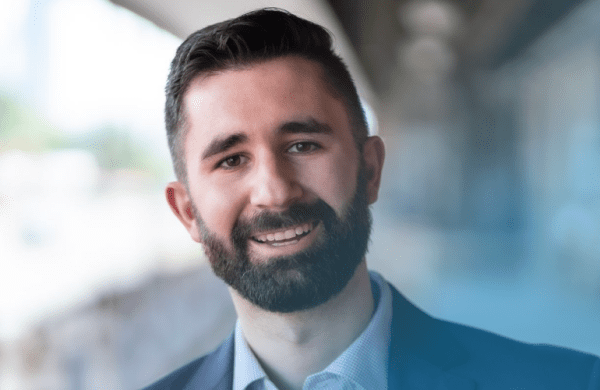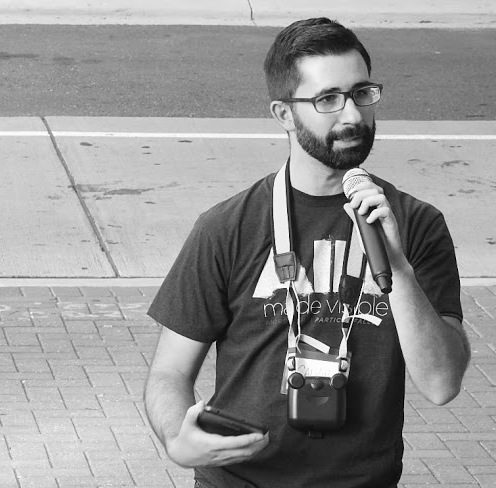Calvin Cupini (2019) wins UNC Charlotte Alumni Award

In December 2024, Calvin Cupini, was one of 10 alumni of UNC Charlotte who was selected as a recipient of the 2024 “10 Under Ten” Award by the UNC Charlotte GOLD Alumni Network. The GOLD (Graduates of the Last Decade) Alumni Network describes the 10 Under Ten as alumni who have “not only made significant impacts and contributions in their professional careers, but are also heavily involved in the community through volunteerism and philanthropy.” Calvin is an alumnus of the Department of Earth, Environmental, and Geographical Sciences after having finished his BS in Earth and Environmental Sciences in 2019. There will be a Dinner/Ceremony on campus on Thursday February 20 for all 10 Under Ten awardees. Brian Magi describes how one of our own graduates earned the 10 Under Ten.
From Dr. Brian Magi:
I met Calvin in Spring 2016 in my ESCI 3101 Global Environment Change course when he asked me questions about what we were going to do about global warming and about the myriad effects a warmer world has on every single person, indirectly probing the question I set up for the semester: How do we achieve a human-environment balance? Calvin and I realized we had actually met outside the classroom in December 2015 at a downtown public hearing session for the Mecklenburg County Board of County Commissioners that we both attended. I remembered him because he spoke in front of elected officials in support of a federally-proposed climate action plan to move states to net zero carbon emissions. Clearly, Calvin was already exploring how classroom experiences could translate into practice before I met him on campus.

Calvin and I talked more in Spring 2016 and we agreed to set up an Independent Study for Fall 2016 related to solutions and implementation, but, even while that was happening, Calvin was also exploring summer internship opportunities. He found one at the non-profit CleanAIRE NC. Coincidentally, I had just joined their Board of Directors in 2015, so I happened to be in the room when the non-profit’s Executive Director told me about a UNC Charlotte student (Calvin!) being considered for an internship.
What started as an internship became a full-time job at CleanAIRE NC. While Calvin was finishing his undergraduate degree, he spearheaded the inception of a Citizen Science Program at CleanAIRE NC. He formalized the idea with CleanAIRE NC leadership and became the first CleanAIRE NC Citizen Science Program Manager. With his new job in 2016 and with my role as a science advisor on the CleanAIRE NC Board of Directors, Calvin and I began talking regularly and studying how low-cost technology might democratize environmental data access. We focused on air quality data within the context of climate change and environmental justice. He began networking with people all around the country and seemed comfortable navigating conversations with neighborhood leaders, non-profits, government sector staff, academics, and even policy makers.
Calvin’s voice as an advocate for community leaders and marginalized groups stood out during his tenure at CleanAIRE NC. While everything takes a village, I would assert that Calvin’s voice helped raise the profile of the entire state of North Carolina in the venue of Citizen Science. He interfaced with academic and EPA scientists in North Carolina, organized and presented at major national conferences, and served as a primary voice on panels. He did this while finishing his undergraduate degree. Some of Calvin’s efforts were documented in a publication titled “Use Case: Citizen Science for Hyperlocal Data Collection – Clean Air Carolina and the AirKeepers” compiled by an independent group called The Data Foundation.
The relationship-building that Calvin led while he was at CleanAIRE NC paid dividends to concerned communities in Charlotte and across North Carolina. One part of Calvin’s work in Charlotte was captured by a Storymap called “Clearing the Air in the Historic West End” that he created. That work won the ESRI Storymap of the Year award in 2019. Also in 2019, Calvin and I wrote and won $8,000 in funding from the American Geophysical Union as a part of their Centennial Grants program to support CleanAIRE NC citizen science. Calvin’s successes helped set the stage for a lot of the recent work that CleanAIRE NC has done. The non-profit now has a national profile and has successfully been awarded federal and private funding multiple times to undertake community science work to achieve environmental justice. To this day, I continue to work with Calvin’s successors in the role of what has become the Community Science Program Manager at CleanAIRE NC.
Calvin left CleanAIRE NC in 2020, worked with another Charlotte group that explored climate adaptation and communication/funding strategies for flood-affected communities, and then took a job at a company in California called Activate. At Activate, he has been helping to develop pathways to fund the movement of climate change solutions research (and other science advancements related to materials, life sciences, and space) into practice. I do not know enough about managing startup funds to do more than nod my head at the details, but I do know climate science! We collectively know that the human-environment balance has been massively disrupted by increasing carbon emissions, and that global warming is a long-timescale existential problem. We also know that the first-order solution begins with massively reducing carbon emissions from the major economic sectors: industry, power generation, transportation, and agriculture. The big part of that reduction is relatively simple in principle, but the last part of those carbon emissions reductions is far more challenging. Think of how electricity generation could transition from majority fossil fuel to majority solar and wind, or how we move from 10% EVs to 100% EVs, or how building materials could be created without fossil fuels, or how commercial planes might be powered by electricity, and then how any of these could be economically viable. This is the problem of “deep” decarbonization. Calvin’s work at Activate injects funding – a lot of funding – to help move deep decarbonization research into practice.
What could be more emblematic of the here and now than an alumnus of the Department of Earth, Environmental, and Geographical Sciences trying to solve climate change?
I nominated Calvin for the 10 Under Ten Award, and I was therefore thrilled to see the GOLD Alumni Network recognize him for his early career achievements. Please join me in congratulating Calvin.